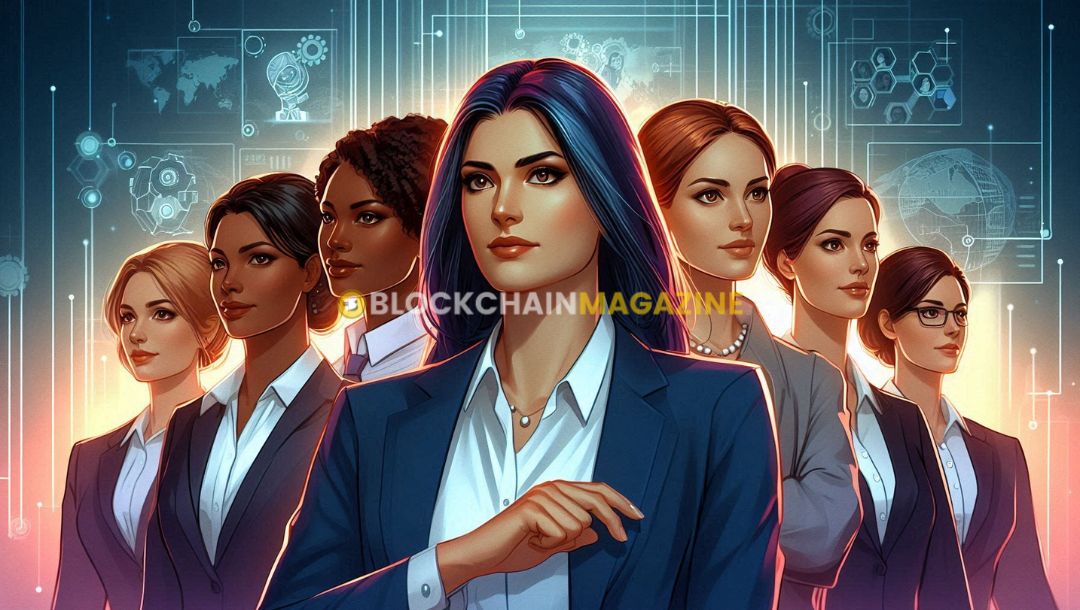In Conversation with Women In Blockchain Rhian Lewis
We had the pleasure of interviewing Rhian Lewis. Rhian Lewis is a software engineer who is the co-developer of altcoin portfolio tracker CountMyCrypto. She is also the co-host of London Bitcoin Women, which she founded with a friend in 2014. She has a BSc in Economics from UCL and is a former digital journalist at @thetimes.co.uk. She is a regular conference speaker and educator on blockchain technology, cryptocurrency and cryptoassets, and writes about blockchain technology at medium.com/@rhian_is. She is also an instructor on the B9Lab Ethereum QA Engineer course.
- Can you tell us what inspired you to pursue this career path? What do you want others to take from your story?
I became a software engineer because I enjoyed learning to solve new challenges everyday. I feel lucky that I get paid for something that I would do anyway. Blockchain technology and cryptocurrency are among the technologies that will shape our future, so I think it’s very cool to be thinking about cutting edge technologies that will have a big impact. I never set out to be a role model –I just consider myself very fortunate to be doing something I love.
- Could you tell us about any of the interesting projects that you are working on currently?
I have a couple of projects that are currently under wraps and unfortunately, I can’t talk about either of them yet! One is a crypto project and the other is a writing project. But I’m also very proud of my involvement with the blockchain education platform B9lab.com, where I am an instructor on the Ethereum QA Engineer course and also CountMyCrypto.com, the altcoin portfolio tracker which I launched with my friend Bruce back in 2014 is still going strong!
- Is there a particular person who you would like to credit with helping you get to where you are? Can you share an anecdote about that?
Rather than one person, I credit the whole community, both in real life in London and Berlin and of course on Crypto Twitter. I’ve made so many good friends over the last few years over a shared interest in this amazing technology. This space seems to attract interesting people who often have opinions and ideas that challenge conventional thinking.
- What are the 5 things that you think are most fascinating about blockchain and crypto? Why?
- People have lost sight of what money actually is. It sounds like a strange thing to say, but we are now totally disconnected from the idea of hard money and how to value currency. Reading The Bitcoin Standard by Saifedean Ammous is a great way to remind yourself of the laws of economics. Answering questions about how and why Bitcoin gets its value is an invaluable insight into how people think about money
- The pace of change in the crypto ecosystem. Crypto years are like dog years, and if you don’t keep your attention focused, everything can change in the blink of an eye. Few areas are evolving quite fast.
- The reaction of the establishments, both in the UK and in other countries. It is fascinating watching the regulators scrambling to keep pace with technologies that they don’t really understand.
- The fact that it gives people a choice that they simply did not have before. The monopoly of state-issued money is a relatively new phenomenon, so the ability to interact using a currency of your choice is simply (as far as I am concerned) restoring the natural order of things
- Individuals being able to interact on a trustless, peer-to-peer basis is an amazing thing. Instead of having to rely on a bank or a corporation, people can set up lending circles, insurance policies, tokenized investments and all kinds of things. Public blockchains provide the infrastructure that small startups would not otherwise be able to afford and are thus leveling the playing field in some way.
- What are the 5 things that concern you about blockchain and crypto? Why?
- Lack of education means that people get scammed, again and again. You can never legislate to stop scammers. But people seem scarily oblivious to gaining the knowledge that they need in order to protect themselves.
- Companies such as Facebook who are launching
centralised digital currencies are powerful lobbyists and are in a position to encourage governments to try to regulate public blockchains. While I believe that a fullydecentralised network like Bitcoin is resistant to this type of censorship, short-term damage could be caused in some countries by these sorts of actions. - At the moment, blockchain hype still outweighs the reality, especially in terms of scalability. There is a risk that in a short
- Technology is obviously neutral. People choose whether to use it for good or evil purposes. But there are vested interests out there who want to prove, for example, Bitcoin can be bad because people sometimes use it for undesirable purposes.
- There is a tension between increasingly authoritarian governments and people who would rather interact on a peer-to-peer basis, without the oversight of governments. The potential for some jurisdictions to stigmatize and possibly criminalize people in the crypto community is a huge risk.
- How have you used your success to bring positive change to the world? Can you share a story?
I don’t credit myself with that level of influence, nor do I consider myself particularly successful. But if people are motivated to go and read about cryptocurrencies or peer-to-peer permissionless networks after reading something I’ve written, then I’d consider that a force for good.
- What are the 3 things that you would advise someone who aspires to emulate your career? Can you share an example for each idea?
My life is not so glamorous, as a consultant software engineer. But for anyone who wants to do something similar, here are my three tips:
- Be hands-on. Learn to program by challenging yourself and building something you don’t know how to build. That way, you will figure things out for yourself instead of just watching tutorials. Even if you don’t do things the ‘right’ way, the process of trial and error can teach you so much.
- Be fearless. I started my technology career very late, after working for 20 years as a journalist. You only get one life, and it’s better to fail than to spend decades wondering what would have happened if you had given something yourbest shot .
- Have integrity. Don’t be tempted to lend your backing to projects you don’t believe in, even if they are promising to pay you lots of money. Just like having one life, you only have one reputation. Don’t throw it away.
- What is the one “Life Lesson Quote” that you stand by? Can you tell us how that had relevance to your own life?
“I have not failed. I’ve just found 10,000 ways that won’t work” – Thomas Edison.
It can be daunting starting a new career in mid-life, and seeking to educate yourself about new technologies when the resources are not necessarily available and when you have to learn from experiences, trials and errors. If someone had told me when I was working as a journalist that one day I would be learning to write smart contracts or figuring out how to mine cryptocurrencies, I wouldn’t have believed them.But if you’ve got enough determination, you can figure most things out in the end.
- Who would be one person in the world that you would love to have a private breakfast or lunch with, and why?
Satoshi Nakamoto. Because I have so many questions!
- Where can our readers find you on social media?
- Twitter: @rhian_is
- Medium: @rhian_is
- LinkedIn: https://www.linkedin.com/in/rhian-lewis-72141221/
Stay informed with daily updates from Blockchain Magazine on Google News. Click here to follow us and mark as favorite: [Blockchain Magazine on Google News].
Get Blockchain Insights In Inbox
Stay ahead of the curve with expert analysis and market updates.
latest from tech
Disclaimer: Any post shared by a third-party agency are sponsored and Blockchain Magazine has no views on any such posts. The views and opinions expressed in this post are those of the clients and do not necessarily reflect the official policy or position of Blockchain Magazine. The information provided in this post is for informational purposes only and should not be considered as financial, investment, or professional advice. Blockchain Magazine does not endorse or promote any specific products, services, or companies mentioned in this posts. Readers are encouraged to conduct their own research and consult with a qualified professional before making any financial decisions. The featured image used is just a creative depiction of the title and it does not intend to hurt sentiments of any person or institution. If it hurts anyone sentiments, please do not hesitate to reach out to Blockchain Magazine.

 Bitcoin
Bitcoin  Ethereum
Ethereum  XRP
XRP  Tether
Tether  Solana
Solana  USDC
USDC  Dogecoin
Dogecoin  Cardano
Cardano  Lido Staked Ether
Lido Staked Ether  TRON
TRON  Chainlink
Chainlink  Wrapped Bitcoin
Wrapped Bitcoin  Sui
Sui  Wrapped stETH
Wrapped stETH  Avalanche
Avalanche  Stellar
Stellar  Hedera
Hedera  Toncoin
Toncoin  Shiba Inu
Shiba Inu  LEO Token
LEO Token  Hyperliquid
Hyperliquid  Bitget Token
Bitget Token  Litecoin
Litecoin  WETH
WETH  USDS
USDS  Polkadot
Polkadot  Bitcoin Cash
Bitcoin Cash  Ethena USDe
Ethena USDe  MANTRA
MANTRA  Wrapped eETH
Wrapped eETH  Uniswap
Uniswap  Ondo
Ondo  Pepe
Pepe  Monero
Monero  Aave
Aave  WhiteBIT Coin
WhiteBIT Coin  NEAR Protocol
NEAR Protocol  Mantle
Mantle  Official Trump
Official Trump  Aptos
Aptos  Dai
Dai  Internet Computer
Internet Computer  Ethereum Classic
Ethereum Classic  Bittensor
Bittensor  Cronos
Cronos  OKB
OKB  POL (ex-MATIC)
POL (ex-MATIC)  Gate
Gate 




